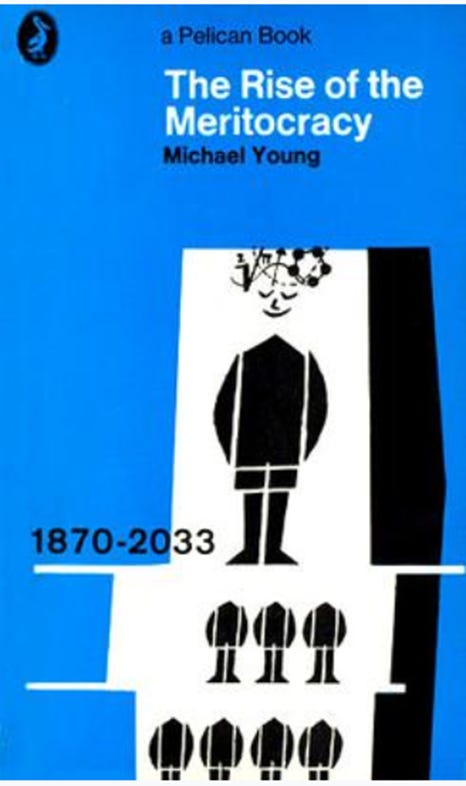When I was 19, back for the summer from University, I worked nights in a local bread factory. One of my fellow workers, Denzel, was 17 and he had recently been expelled from school for violent behaviour. Even at that young age he had a string of convictions for various crimes. We became friends. He was a very funny and sharp character, and his many stories were brilliant. One night he showed me his new mobile phone (at that time very rare and expensive) and he asked me to read the instructions for him as he could not read. I was astounded that the two of us could have been through the same government school system, in the same relatively affluent area of southern England and I was at university, and he could not even read.
In our world today, the idea of a ‘meritocracy’ being an inherently positive thing goes largely unquestioned, I think. Surely it is best that those with merit are the ones that succeed in our society, especially in contrast to systems like aristocracies, where success is linked instead to family, wealth, and connections?
Interestingly though, for Michael Young who originally coined the word ‘meritocracy’ very much meant the opposite. For him, a meritocracy was a very bad thing, and something we should avoid. He felt that the idea that if society was re-stratified so that those on top were now the clever and hard-working ones this would produce a society of arrogant, insensitive winners, and desperate, angry losers.
I was reminded of this debate following a recent interview on our podcast with Faiza Shaheen, an academic and potential new MP here in the UK, who has written a brilliant book about her life as a working-class woman of colour growing up in my area of London, and the complete myth of social mobility in modern Britain.

What if meritocracy is simply another form of class oppression, and in some ways an even more dangerous one? Basically, just because you are clever why should you have more money, more wealth, and a better life, any more than someone who has inherited a fortune from their parents? Why is that any morally better?
One thing that is pretty clear it seems to me is that a huge amount of what we call merit is actually based on our upbringing, our parents, and our home background. The huge gap between Denzel and I even at age 17 and 19 was clearly not about our genetic inheritance but our social and class inheritance instead. In short Denzel came from a poorer area and had a troubled and tough family background, I had supportive parents and a house full of books.
But even if it wasn’t, if all the other elements of upbringing and luck and class were somehow equalised, and our opportunities entirely equal, why should that entitle me to be the only one who has access to the things that make up a happy or satisfying life?
Fuelling anger and resentment
Peter Adamson, who for many years’ wrote Unicef’s State of the World’s Children report, points out how in some societies, particularly rich ones, instead of the pyramid of income, there is a diamond, with some extremely rich people at the top, and then a large, relatively educated middle class. Underneath that are a large group of poor people, who become angry at the educated elites who are not interested in their lives and blame them for their own problems. He worries that politicians in democracies can now rule with the support of those at the top and at the middle, and that this is powerfully legitimised by the notion of meritocracy.
It is also arguably internalised by those at the bottom. At least with class or feudalism, the injustice of the system was very clear and based on obviously flimsy foundations like inherited wealth that did not stand up to scrutiny. With meritocracy, those with less , those struggling to get by, are again devalued because they are supposedly less clever and less able, or less hard-working.
In his research Michael Sandel found that Trump whilst standing for election in 2016 and as president never used what he calls ‘the rhetoric of rising’ the ‘idea that you can make it if you try’- generally Instead focusing on reassertions of national sovereignty, identity and pride.
Inequalities based on class, or on gender, ethnicity or race are of course alive and well in the world, and that no country has achieved pure equality of opportunity. His main point though is that even if such a state were achieved, still with deeply unequal outcomes but this time because of say education, or another idea of what ‘merit’ is, these outcomes would not be no more morally defensible or acceptable.
The whole story of a meritocracy and equality of opportunity is based on ‘escape’ from an undesirable state. A state where presumably the rest of humanity has to remain, by implication because they did not work hard enough, or are not clever enough. Instead of building societies that actually fix the conditions that people want to escape, we focus only on making escape fairer for the lucky few.
A society that works for everyone, not just the lucky few
Instead, it seems to me that these critics of meritocracy are right. That any society based entirely on ‘winners and losers’ - however winning is defined- is not a good society to aim for. That we should be focusing on instead the idea that all people are of equal value, regardless of their different abilities; that a fair society is one that makes the possibility of a happy and fulfilling life, in all its millions of different varieties, available to everyone. That cooperation, not competition is the key to a good society. And that central to building these fair societies this is a dramatic reduction in inequality.
END.
Author: Max Lawson, Head of Inequality Policy at Oxfam International and EQUALS podcast co-host. He is also the co-chair of the Global People’s Vaccine Alliance.
Catch our podcast episode on meritocracy with Faiza Shaheen here.
Always remember to share and follow us on X and connect with us on LinkedIn.






